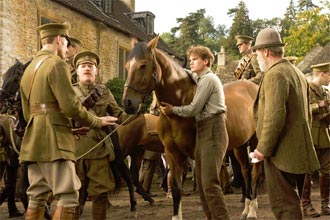 DreamWorks
DreamWorks
146 min., dir. by Steven Spielberg, with Jeremy Irvine, Emily Watson, and Peter Mullan
I always try my best to base my reviews solely on the product at hand and not its source material, but I can’t help but think that maybe the storytelling of War Horse has more of an impact as a stage production. The film features incredible effects and expansive battle scenes far greater than what could be presented on stage, but that doesn’t save the movie from being a massive letdown.
Related Posts
Looking to buy a cheap plow horse at auction, Ted Narracott decides to spend more than he should on a horse not fit for the job, solely because he sees some intangible quality in the animal. The horse turns out be be from a neighboring farm, and Ted’s son Albert has watched the horse grow up and has had an attachment to him since day one. Performing a miracle by actually plowing an entire field in one night, just as the farm’s landlord was preparing to cancel the lease, Joey (as the horse is named) suddenly proves to be invaluable. Unfortunately, torrential rains destroy the Narracott’s crops, and Ted has to sell Joey to an army captain to raise his rent money. From that point forward, Joey becomes entangled in every aspect of the war and changes hands to a new owner nearly every other day.
Focusing on the story alone, yes, this is meant to be an uplifting tale of improbable means, but let’s face the facts. In real life, based on the situations mapped out, this horse would have been shot 52 times in the first half hour of the movie. Not because it would be the victim of stray fire or general warfare, but simply because it requires far too much chiding to do any task because it was not properly trained. In the early 1900s, it took less than a blink of an eye to put down a horse in these situations. Being an allegory about the toughness and bravery of soldiers or not, this horse survived by the skin of its teeth way too often.
To reference the work done by the horse in the film as anything less than a performance is a crime. The actions this creature performs are breathtaking. Certainly doing its job replacing the stage puppet, I dare you not to be awestruck by the animal’s prowess. However, besides the grandiose trench warfare sequences that for the most part are horseless, the movie drowns in its own schmaltzy drama. The fantastic work getting the horse to play a part goes unrewarded.
Just as ET was the story of a boy and his dog (where the dog is from outer space), War Horse is essentially Lassie, Come Home. A brilliant, special animal gets separated from its owner and the love the two have for one another brings them back together, no matter the odds against them. In the case of War Horse, though, every character seems to pay too much attention to the horse, to the point where wounded and dying soldiers receive worse treatment or are flat out ignored. At a certain point, it feels that anyone connected to the horse will probably die prematurely. Am I the only one who finds this offensive?
Soldiers are strong, no matter what you throw at them; they will always go back into the fray. Everything you do in life leads you home. Friendships are unbreakable. Fight for what you know is right. The horrors of the world leave for better things. Take your pick of what message you want War Horse to send you. It hits them all in one way or another, just not in any worthwhile fashion. A film that tries to expand the world of the play only to finish just like a stage production, War Horse drags its way across the finish line.
—
Matthew Schuchman is the founder and film critic of Movie Reviews From Gene Shalit’s Moustache(http://shalitsstache.com) and also the contributing film writer for IPaintMyMind(http://ipaintmymind.org).